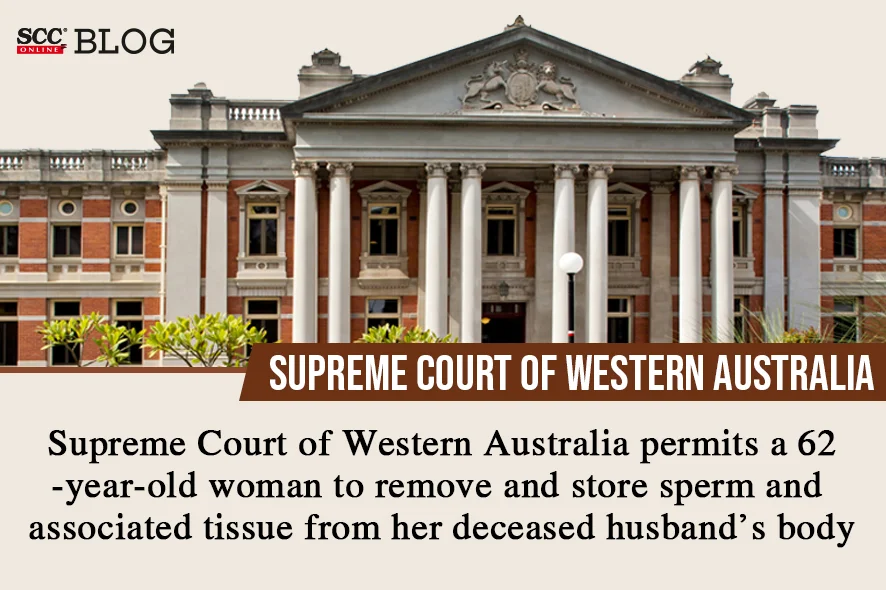Supreme Court of Western Australia: While considering the instant application wherein the applicant, a 62-year-old woman, prayed to the Court seeking an order to remove and store spermatozoa and associated tissue from her deceased husband’s body; the Bench of Seaward, J.*, allowed the application and directed the medical practitioner of Adora Fertility or another permitted practitioner within the meaning of Section 24 of the Human Tissue and Transplant Act 1982 (WA) to immediately remove spermatozoa and associated tissue from the body of the deceased husband and such spermatozoa and associated tissue shall be stored in accordance with the 1982 Act. It was further ordered that the spermatozoa and associated tissue so removed and stored, must not be used for any purpose without an Order of the Court.
The Judge clarified that the order is limited to permitting the removal of the spermatozoa and does not constitute authorisation for the spermatozoa to be used by the applicant and does not in any way considers whether the applicant can or cannot meet any statutory criteria in that regard.
Background: The applicant got married on 04-06-1983 and she had 2 children, a daughter and a son from her marriage to Mr H (the deceased husband). However, tragedy struck the couple and their daughter and son passed way in 2013 and 2019 respectively.
The applicant submitted to the Court that before Mr H’s demise, the couple had been discussing about having another child using Mr H’s sperm.
On the applicant’s visit to the fertility clinic, she was advised against having a child due to her age, after the doctors tested Mr H’s sperm, they concluded that his sperm can be used to have a child.
The applicant further stated that she has a cousin in the Philippines who is in her twenties and has volunteered to be a surrogate for the applicant and the deceased. However, the legal requirements in the Philippines are such that the applicant and the deceased would have been required to live in the Philippines for a certain period before being able to proceed, and to date they were unable to do so due to work commitments. The applicant further submitted that the couple could not take any further steps in relation to surrogacy due to COVID and the death of the applicant’s mother-in-law.
Mr H died on 17-12-2023, the wife brought the instant application urgently on 18-12-2023.
Relevant Statutory Provisions:
As per Section 22 of Human Tissue and Transplant Act, 1982 (WA) concerning Donations of tissue after death, a designated officer may authorise removal of tissue from bodies in hospital.
Section 23 of the 1982 Act requires the Coroner to give consent to the removal if the designated officer believes the death of the person is or may be a reportable death under the Coroners Act 1996 (WA).
The effect of Section 24 of the Act is that an authority issued under Section 22 will authorise a medical practitioner who is not the designated officer who has authorised the removal or is not either of the two medical practitioners who have declared irreversible cessation of all function of the deceased person’s brain, and the respiration and circulation of the blood is being maintained by artificial means, to remove the tissue for a permitted purpose.
Court’s Assessment:
The Court noted that after the death of Mr H, the delegate of the State Coroner for Western Australia provided her oral consent for the removal of spermatozoa from Mr H in accordance with s 23(4) of the Act, with written confirmation of that oral consent being provided the following day.
The Court pointed out that it has jurisdiction under S. 22 of 1982 Act and under Rules of the Supreme Court 1971 (WA) together with Section 22 to make an order sought by the applicant, provided the conditions stipulated in S. 22 for the removal of tissue are met.
The Court noted that the word ’tissue’ as used in S. 22 of 1982 Act includes spermatozoa by reason of the definition of ’tissue’ contained in S. 3 of the 1982 Act. The Court thus accepted that removal of spermatozoa for the purposes of storage for later use in IVF procedures constitutes a ‘medical purpose’ within the meaning of S. 22(1)(b).
The Court stated that in order to pass an order favouring the applicant, it has to be satisfied that there was no reason to believe that the deceased person had expressed an objection to the removal after death of the spermatozoa from his body for medical or scientific purposes (in this case being storage for later use in IVF procedures). In order to achieve this satisfaction, the Court asked several questions to assess the reliability of the applicant’s evidence and to examine whether her evidence is fulfilling the criteria under S. 22 of 1982 Act.
Taking note of the written and oral evidence presented by the applicant the Court was satisfied that the husband did not object to the removal of his sperm in the event of his demise.
The Court further noted that under Section 22 obtaining a Court Order is not necessary to for the removal of tissue. However, the Court was informed that the applicant had made those attempts, but the hospital did not make the designated officer available and despite requests made by the applicant’s counsel to speak to the designated officer, her case was not considered. The Court expressed its disappointment that once again, an applicant has been required to attend Court on an urgent basis and in traumatic circumstances to obtain an order which could have been granted in a faster and more streamlined manner by a designated officer if they had considered all criteria to be met.
With the afore-stated assessment, the Court thus passed an ex-parte order in favour of the applicant.
[Re Section 22 of the Human Tissue and Transplant Act, 1982, [2023] WASC 487, decided on 21-12-2023]
*Order Justice Seaward







